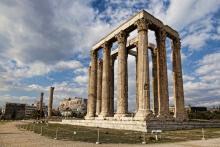Ancient Greece

When the Summer Olympics opened in London, there was a version of a religious ritual in the Olympic oath, procession of athletes and lighting of the flame. This was no accident because the modern Olympics have religious roots, though they appear to have largely secular fruits.
I'm reminded of this fact because it was in London in 1908 that Anglican Bishop Ethelbert Talbot first said, "The most important thing in these Olympics is not so much winning as taking part" — a phrase that became part of the Olympic creed. He was following in the footsteps of the Rev. Henri Didon, a Catholic priest who gets credit for the official Olympic motto "citius, altius, fortius" (faster, higher, stronger).
The founder of the modern Olympics, Baron Pierre de Coubertin, was educated by Jesuits. "The first essential characteristic of the Olympics, both ancient as well as modern, is to be a religion … above and outside the churches," he said. He was influenced by proponents of "muscular Christianity," who turned away from traditional Christian contempt for the body and used sports as a method of strengthening faith and morality.
Muscular Christianity became popular in Victorian England and spread to the U.S., where it shaped the programs of the YMCA and Boy Scouts of America, as well as church sports leagues. Although it declined in mainline Protestantism in the 20th century, it remained strong in evangelical organizations, such as the Fellowship of Christian Athletes and Promise Keepers. Today, muscular Christianity is alive and well in professional athletes such as Tim Tebow and Jeremy Lin.